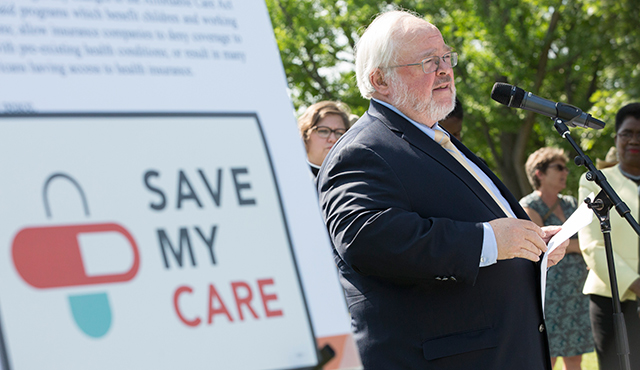The Affordable Care Act has ushered in seismic changes in access to care and how it is delivered to millions of Americans. At St. Joseph Hoag Health, we are serving many more people who have regular access to health care for the first time. While not perfect, the ACA has resulted in new Medicaid coverage for 3.7 million people living in California and more than 20 million across the country. That is nothing other than a major success. The U.S. House and Senate bills to replace the ACA will largely dismantle these coverage gains, including the Medicaid expansion. Undoing that progress is unconscionable.
These plans will cause a staggering 22 million people to lose their health coverage by the end of the decade and 15 million to go uninsured by 2018, according to a projection from the Congressional Budget Office released Monday.
The massive cuts in the Senate’s Better Care Reconciliation Act will not only cancel the Medicaid expansion, they also will deconstruct this vital program. This will have disastrous and far-reaching effects. Medicaid today supports rural health clinics, preventive screenings for at-risk children, prenatal care for pregnant women and many other services. Medicaid also is the largest provider of long-term care and nursing home services for the frail and elderly in the U.S.
These cuts would affect people like Gloria Colazo, a 58-year-old self-employed Fullerton resident and community advocate who suffered a stroke in 2010 and didn’t have health insurance; she received care at St. Jude Medical Center and the St. Jude Neighborhood Health Center. Because of the MediCal expansion in California, Gloria gained coverage that allows her to see specialists and get MRIs, medications and blood tests without worrying about the costs. If her coverage went away, the impact on her health would be dire, she says. She’d be unable to afford follow-up care and the gains she’s made would likely slip away.
Passing the Senate bill means fewer people will have Medicaid to count on when they are confronting diabetes, an opioid addiction, a mental health issue, an aging parent that needs nursing home care, or special services for a child with a disability. These are some of the most fragile and vulnerable people in our communities.
We believe that health care is a basic human right. It should be accessible and affordable for all, because illness can affect anyone. If health care insurance is not available or affordable, many will choose not to seek treatment and will suffer unnecessarily. Ultimately, large population losses in coverage and access will affect the health and well-being of entire communities.
The bill currently under consideration in the Senate would make the biggest changes to Medicaid since it began in the 1960s. It will be catastrophic to individuals and families across our state. This is not the right solution.
As a nation, we can’t go backward. We must continuously move forward. We need thoughtful legislative solutions that will maintain coverage levels. Together, we can find ways to make Medicaid programs more innovative and efficient – in some states that work is already well underway.
– Dr. Afable is executive vice president of Providence St. Joseph Health Southern California Region-Orange County/High Desert and president and CEO of Irvine, Calif.-based St. Joseph Hoag Health

